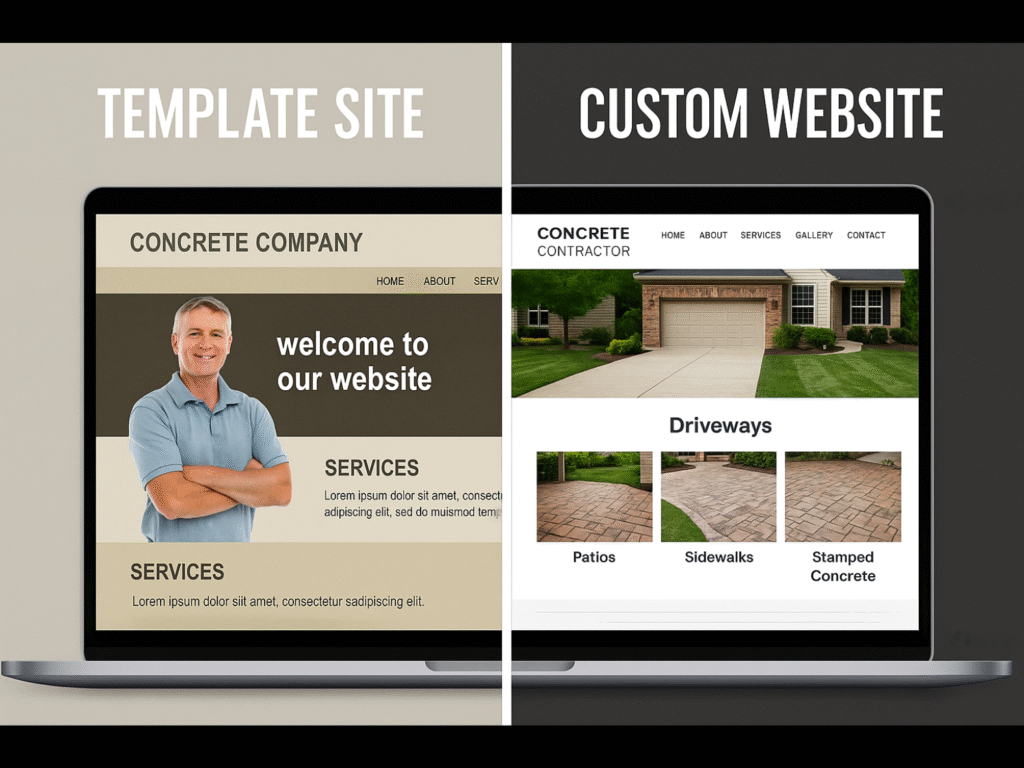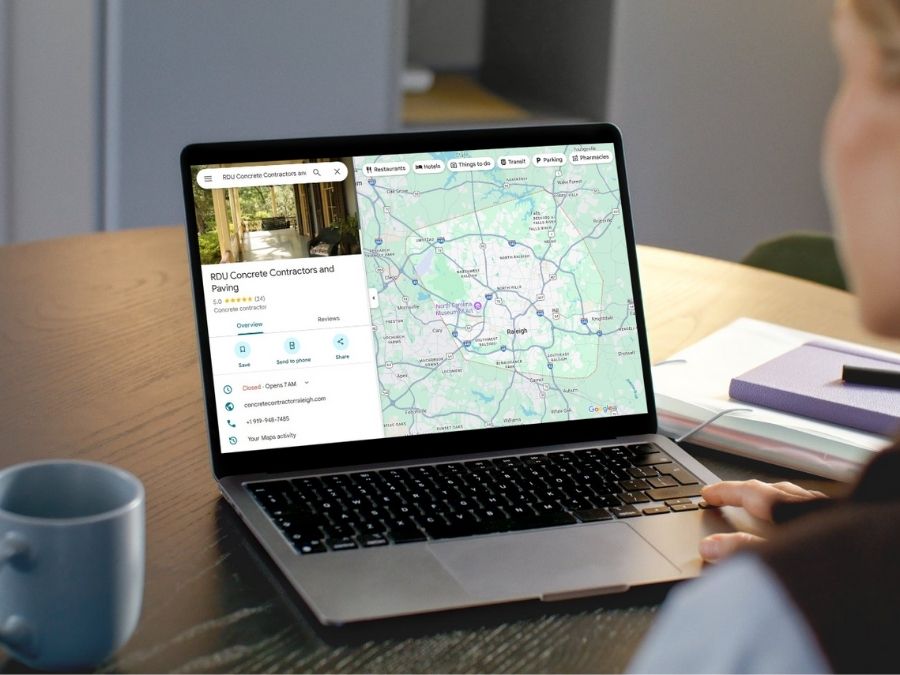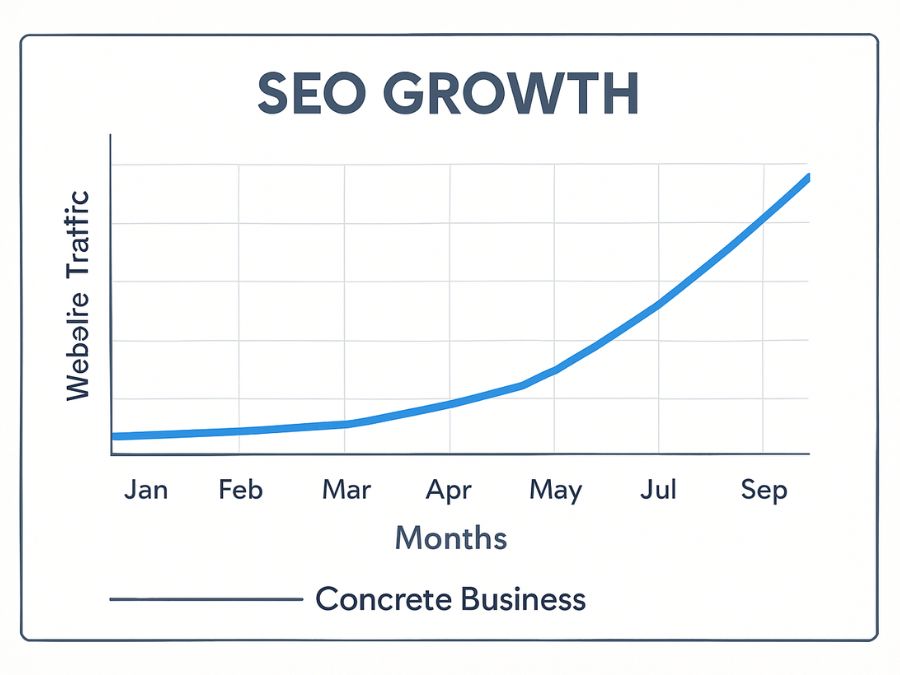The Reality of Marketing Your New Concrete Business (What Actually Works)
Here’s what happens to most new concrete contractors: They Google “concrete contractor marketing” and get bombarded with the same recycled advice from a thousand different websites. Generic tips that don’t account for the unique challenges of the concrete industry.
Nobody tells you the real story about marketing a concrete business—the seasonal fluctuations, the weather dependencies, the difference between residential driveways and commercial pours. Until now.
After helping hundreds of contractors across every trade, I’ve learned that concrete companies face specific marketing challenges that generic advice completely misses. Your busy season isn’t the same as a plumber’s. Your customer decision-making process is different than an HVAC company’s. Your project values range from $500 sidewalk repairs to $50,000 commercial jobs.
If you’re starting a concrete business with a limited budget, this is your roadmap to avoid the expensive mistakes I see companies make every day.
The Foundation: Your Professional Website
Everyone tells you that you need a professional website, but most concrete contractors get this completely wrong from day one.
Avoid the Template Trap
Here’s a harsh reality: Those cheap website builders like Squarespace, Wix, and GoDaddy will kill your concrete business’s online growth potential.
The Problem: You never actually own your website. The moment you stop paying them, years of investment in content, rankings, and brand recognition disappear forever. I’ve watched concrete companies lose thousands of dollars in SEO value because they built on rented ground.
The Solution: Invest in a custom website from the start. Yes, it costs more upfront. But I’ve seen too many concrete contractors spend $200/month for three years on a template site, then have to start over with a real website. That’s $7,200 down the drain, plus lost opportunity costs.

The Concrete-Specific Website Requirements
Your concrete website isn’t just a digital business card—it’s your most powerful sales tool. Here’s what it must include:
Project Gallery: High-quality photos of driveways, patios, sidewalks, decorative concrete, and commercial pours. Separate galleries for residential and commercial work because the audiences have completely different needs.
Service Area Maps: Concrete is location-dependent. Show exactly where you pour, including travel fees for distant jobs. This prevents wasted calls from customers 100 miles away.
Concrete Calculator Tools: Let customers estimate basic project costs. This qualifies leads and reduces time spent on price shoppers who aren’t serious.
Weather Policy: Address the elephant in the room. Explain how weather affects scheduling and why concrete can’t be poured in certain conditions.
Investment Reality Check
The concrete industry is competitive, and your website is often the first impression potential customers get. Here’s the truth about pricing:
- Budget Range: $4,500 to $15,000 for a proper concrete contractor website
- Why the Range: Depends on features like project calculators, service area tools, and integration with your scheduling system
- What to Avoid: Any company promising “complete concrete marketing” for under $300/month—it’s always a template with broken promises
I’ve audited hundreds of concrete contractor websites. The ones generating consistent leads invest in custom design, fast loading speeds, and mobile optimization. The ones struggling with marketing usually have websites that look like they were built in 2010.
Google Business Profile: Your Lead Generation Powerhouse
Your Google Business Profile is the most underutilized lead generation tool in the concrete industry. When someone searches “concrete contractors near me” at 6 AM before work, your profile determines whether they call you or your competitor.

Category Selection Strategy
This is where most concrete contractors sabotage themselves. If you do driveways, patios, sidewalks, and commercial work, your primary category should be “Concrete Contractor”—not “Driveway Contractor” or “Patio Builder.”
Why This Matters: Google uses your primary category to determine which searches you appear for. Choose too narrow, and you miss opportunities. Choose too broad, and you don’t rank for anything specific.
Secondary Categories: Only add these if you actually provide the service—”Stamped Concrete Contractor,” “Concrete Repair Service,” “Sidewalk Contractor.” Don’t stuff categories just to cast a wider net.
Service Area Strategy for Concrete Companies
Most concrete contractors make a critical mistake here. If you don’t have a physical office where customers come for consultations, use service areas instead of a street address.
The Setup: Define your primary service area first—usually a 30-45 minute drive from your base. Don’t immediately add every city within 100 miles hoping to attract more customers.
The Reality: It’s better to dominate concrete searches in 5 nearby cities than to barely show up for 20 distant ones.
The Review Strategy That Actually Works
Here’s the uncomfortable truth about getting your first Google reviews: You might not have customers yet, but you need reviews to get customers. It’s the classic catch-22.
The Solution: Do small concrete jobs for friends and family in exchange for honest reviews. Pour a sidewalk section, repair a cracked driveway, or seal a garage floor. These smaller projects let you practice while building your review foundation.
Never: Buy fake reviews or pay for them. Google’s algorithms detect this, and getting banned kills your online presence entirely.
SEO: The Long Game That Pays Off
SEO for concrete contractors is where the biggest opportunities lie, but it’s also where new companies waste the most money.

Why New Concrete Companies Should Wait
Real SEO that actually ranks your concrete company and generates leads requires a significant monthly investment—typically $3,000 to $7,000 per month for competitive markets.
The Problem: You won’t see results for 4-6 months minimum. As a new concrete business, you need leads next month, not next year. That monthly SEO budget could fund Google Ads that start generating calls immediately.
The Exception: If you have significant startup capital and can handle 6+ months of SEO investment before seeing returns, starting early gives you a long-term advantage.
On-Site SEO: Do This From Day One
While you shouldn’t invest in monthly SEO services yet, your website needs proper on-site optimization from launch day.
Essential Elements:
- Page titles targeting concrete services in your city
- Service pages for each concrete type (driveways, patios, sidewalks, commercial)
- Local schema markup so Google understands your service areas
- Fast loading speeds (critical for mobile users)
- Internal linking between related concrete services
Why This Matters: Proper on-site SEO provides the foundation for future ranking success. It’s much harder to fix these elements later than to build them correctly from the start.
The Cheap SEO Warning
I’ve had this conversation with concrete contractors dozens of times: “We’re paying $400/month for SEO and getting no results.”
The Reality: Any SEO company charging under $2,000/month for concrete contractor SEO either doesn’t understand the industry or can’t deliver results. They’ll burn your budget for months with no ranking improvements.
Red Flags: Companies offering to build your website, manage social media, handle reviews, and do SEO all for under $500/month. It’s physically impossible to deliver quality work at those prices.
Google Local Service Ads: Your First Advertising Investment
Once your website is live and your Google Business Profile has some reviews, Local Service Ads should be your first paid advertising channel.
Why LSA Works for Concrete Companies
Pay-Per-Lead Model: You only pay when someone actually contacts you, not just clicks on your ad. For concrete work, where leads can be worth thousands, this makes financial sense.
Credibility Factor: The Google Guarantee badge builds trust with customers comparing multiple concrete contractors.
Mobile Optimization: Most concrete contractor searches happen on mobile devices, and LSA is designed for mobile-first customer behavior.
The Speed-to-Lead Reality
Concrete projects often start with urgency—a cracked driveway, a planned patio for an upcoming event, or a commercial pour with a tight deadline.
The Rule: Respond to LSA leads within 3 minutes or lose most opportunities. Customers call the next contractor if you don’t answer.
The Solution: Set up call forwarding to your mobile phone and use auto-response systems for after-hours inquiries.
Tracking What Matters
Essential Metrics for Concrete Contractors:
- Cost per lead by service type (driveway leads cost different than commercial leads)
- Lead-to-estimate conversion rates
- Estimate-to-job conversion rates
- Average project value by lead source
- Return on ad spend (ROAS)
Why Tracking Matters: A $500 sidewalk lead and a $15,000 driveway lead have completely different values. Track them separately to optimize your ad spend.
CRM: Organizing Your Concrete Business
A Customer Relationship Management system becomes critical once you’re generating multiple leads weekly.
Concrete-Specific CRM Needs
Project Pipeline Tracking: New Lead → Estimate Scheduled → Quote Sent → Job Approved → Materials Ordered → Pour Scheduled → Job Completed → Follow-up for Reviews
Weather Integration: Track weather delays and automatically reschedule pours when conditions aren’t suitable.
Materials Management: Link to suppliers for pricing updates and delivery coordination.
Photo Documentation: Store before/after photos for each project to build your portfolio.
Recommended CRMs for Concrete Contractors
Jobber: Excellent for smaller concrete operations. Handles scheduling, invoicing, and customer communications in one platform.
BuilderTrend: Better for larger concrete companies handling commercial projects. Includes project management tools and budget tracking.
JobNimbus: Built specifically for contractors. Strong photo management and customer communication features.
Setup Requirements: Don’t get a CRM unless you’ll configure lead forms, automated follow-ups, and project pipelines. An unused CRM is just another monthly expense.
The 10-Step Concrete Contractor Marketing Plan
Most new concrete companies try to do everything simultaneously and end up doing nothing well. Here’s the step-by-step approach that actually works:
Phase 1: Foundation Building
Step 1: Professional Website Get a mobile-optimized, fast-loading website with concrete-specific features and local SEO basics.
Step 2: Google Business Profile Set up your profile correctly, start collecting reviews, and post regular updates showing current projects.
Step 3: Google Local Service Ads Get approved and start generating your first online leads.
Phase 2: Lead Management
Step 4: Tracking Systems Implement call tracking and lead source attribution so you know which marketing generates revenue.
Step 5: Response Automation Set up missed call text-backs and instant lead acknowledgments to maximize conversion rates.
Step 6: Performance Analysis After 50 leads, analyze which services and areas generate the best return on investment.
Phase 3: Growth and Optimization
Step 7: CRM Implementation Install and properly configure a contractor-specific CRM to manage growing lead volume.
Step 8: Portfolio Development Invest in professional photography for completed projects. Quality visuals sell concrete work better than any written description.
Step 9: Google Ads Expansion Layer in search ads for high-intent keywords like “concrete driveway cost” and “stamped concrete contractors.”
Step 10: SEO Investment Begin long-term SEO strategy focusing on competitive concrete keywords in your market.
The Real Success Formula
Most concrete businesses fail at marketing because they either try everything at once or fall for cheap solutions that promise immediate results.
The Truth: Building a successful concrete business marketing system takes time, proper investment, and understanding of your unique industry challenges.
The Process: Start with the fundamentals, measure everything, and scale what works while eliminating what doesn’t.
After helping concrete contractors across dozens of markets, the pattern is clear: Companies that follow this systematic approach consistently outperform those chasing every new marketing trend.
Ready to build a concrete business that dominates your local market? Start with step one and build your foundation properly. Your future self will thank you for doing it right from the beginning.







